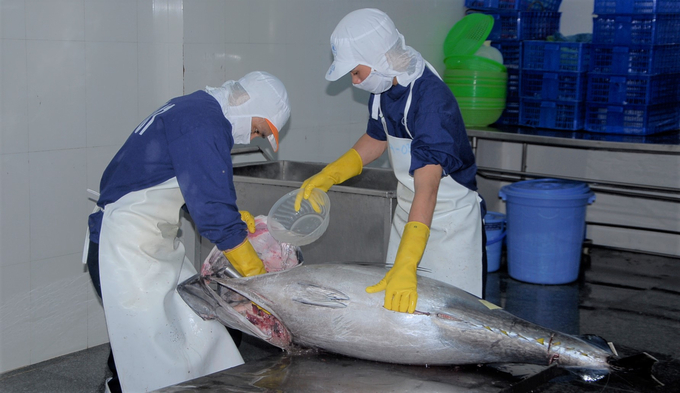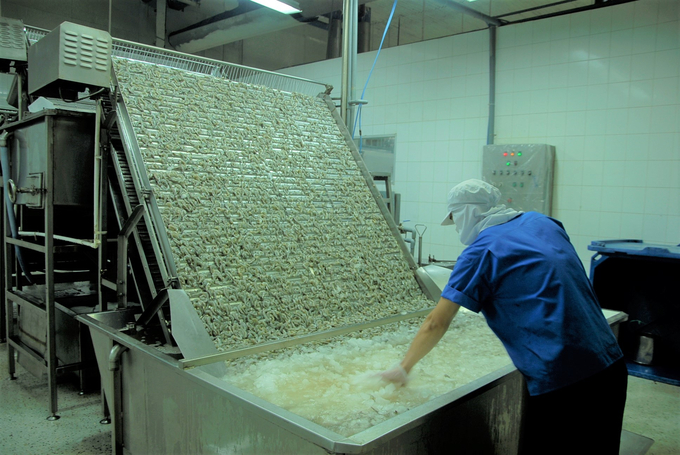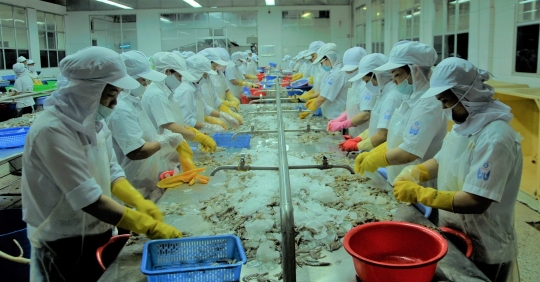Orders up to 50% discount
Binh Dinh currently has 7 fish processing companies for export including: Binh Dinh Seafood Joint Stock Company, Lam Son Import and Export Food Joint Stock Company, Quy Nhon Frozen Joint Stock Company and Hoai Nhon Seafood Joint Stock Company, Binh Dinh Mai Tin Co., Ltd., Thanh Thai Company and An Hai Seafood Company. The total processing capacity of these 7 companies is about 17,000 tons/year, mainly frozen tuna and shrimp…
Currently, Binh Dinh’s fish products are exported to 46 markets including EU, Korea, Hong Kong, Japan, China, USA and Central America… with the US market being the mainstay. In 2022, Binh Dinh’s seafood export turnover reached US$155.7 million, up nearly 68% from the same period in 2021, accounting for 10.7% of this province’s export turnover structure.

Binh Dinh Seafood Joint Stock Company buys tuna from Quy Nhon fishing port. Picture: VDT
As the “leading bird” in the seafood processing industry for export in Binh Dinh, Binh Dinh Seafood Joint Stock Company has been constantly seeking new markets and diversified products. In 2022, the company aims to export USD 100 million and reach almost USD 140 million by the end of the year.
According to Ms. Cao Thi Kim Lan, director of Binh Dinh Seafood Joint Stock Company, the European market previously accounted for a very high proportion of the company’s export sales, including the German market. However, due to the impact of the European Commission’s (EC) ‘yellow card’ for seafood, companies have moved to explore more other export markets to minimize risk. At present, the company produces a variety of products, from tuna fillets to canned tuna, to meet the needs of the market.
At the start of the first quarter of 2023, Binh Dinh Seafood Joint Stock Company’s orders fell by 50% compared to the same period in 2022. It was difficult to find new orders, raw material prices rose again, which caused companies to “expand” due to the difficulties. husband difficult.
Currently Binh Dinh Seafood Joint Stock Company is trying to keep jobs for thousands of employees; Workers stop working overtime, split holiday and weekend breaks, and try to keep the average wage of workers at VND8.5 million/person/month to keep employees.

Binh Dinh Seafood Joint Stock Company manufactures a wide range of products from tuna fillets to canned tuna. Picture: VDT
“Not only the EU, in the near future the US and Japanese markets are also likely to apply “IUU” to Vietnamese seafood. This is a major challenge for the operation of seafood processing companies for export in Binh Dinh in particular and the country in general. Therefore, seafood exporters hope that Vietnam will soon remove the “yellow card” to maintain traditional markets, alongside efforts to find markets,” said Ms. Cao Thi Kim Lan.
I look forward to the easing of credit
Potential companies such as the Binh Dinh Seafood Joint Stock Company are still struggling, and other seafood processing companies for export in Binh Dinh are having an even harder time.
Every company struggles to find output in the face of oversupply. Even seafood importers are pushing prices down, but manufacturers must also sell at cost, even below cost, to keep production going, stabilize the workforce, and most importantly, keep capital steady.
At present, most seafood processing companies for export in Binh Dinh are able to maintain the basic labor base. Because if production stops, factory officials and workers will be forced to find other jobs, until the market improves it will be difficult to mobilize labor to meet production.

The production facility of Quy Nhon Frozen Joint Stock Company (Binh Dinh). Picture: VDT
Mr. Bui Quang Ha, director of Quy Nhon Frozen Joint Stock Company, said: In 2022, the company still maintains stable production, the main product is all kinds of shrimp, processed according to the requirements of customers with the company.Capacity of 1,000 tons/year, exported to Korea, Philippines and Europe. Especially after the European Union-Vietnam Trade Agreement (EVFTA), the tax incentives for shrimp products are a benefit for the company to maintain stable orders, thereby safeguarding customers’ lives. However, at the end of February 2023, the company had only 84 employees, down 30 employees compared to the beginning of 2022, workers’ income was also reduced due to lack of orders.
“The company is struggling to find orders to keep production going, secure revenue and retain employees. At present, we are focusing on developing new markets and new customers for shrimp export and organizing adequate production to get through this difficult period,” said Mr. Ha.

A shrimp processing stage of Quy Nhon Frozen Joint Stock Company (Binh Dinh). Picture: VDT
According to Ms. Cao Thi Kim Lan, director of Binh Dinh Seafood Joint Stock Company, companies need to build large cold stores, invest in infrastructure and equip machines to proactively source raw materials for production in some key export markets such as the US and Europe. Therefore, seafood processing companies for export in Binh Dinh urgently need commercial banks to explore investment opportunities for capital building and expand the production scale of companies to seize opportunities when the market is not ready.
According to fish processing company in Binh Dinh, lending rates have risen dramatically over the past 3 months, with a wider range than the previous normal rise. Therefore, companies are asking Binh Dinh-based commercial banks to consider and support a reduction in corporate interest rates from 1.5% to 2% per annum on short-term medium- and long-term Vietnamese dong loans. Reduce 0.5 – 1%/year for short-term USD/EUR loans.
In addition, the companies suggested that commercial banks increase or maintain credit limits, extend debt and not reduce credit levels in order to create favorable conditions for companies in debt-to-maturity service and inventory management, especially for long-standing companies with high creditworthiness.

